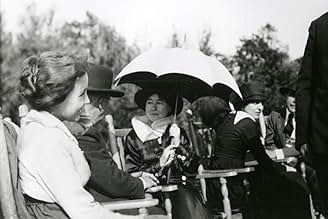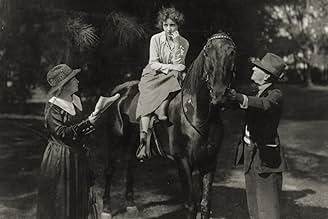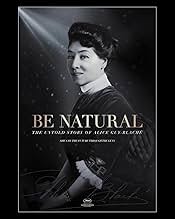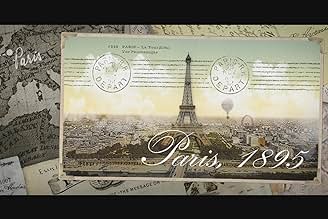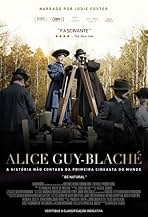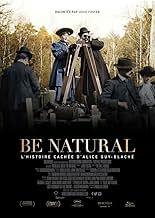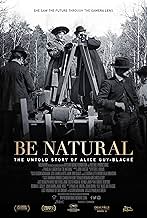Sé natural: Alice Guy-Blaché
Título original: Be Natural: The Untold Story of Alice Guy-Blaché
PUNTUACIÓN EN IMDb
7,7/10
1,2 mil
TU PUNTUACIÓN
Rastrea las circunstancias por las que la cineasta Alice Guy-Blaché se desvaneció de la memoria y el camino hacia su recuperación.Rastrea las circunstancias por las que la cineasta Alice Guy-Blaché se desvaneció de la memoria y el camino hacia su recuperación.Rastrea las circunstancias por las que la cineasta Alice Guy-Blaché se desvaneció de la memoria y el camino hacia su recuperación.
- Dirección
- Guión
- Reparto principal
- Premios
- 11 premios y 11 nominaciones en total
Jodie Foster
- Narrator
- (voz)
Jon M. Chu
- Self
- (as Jon Chu)
Reseñas destacadas
There is so much talk of the Hollywood Boys' Club and the lack of diversity right now. Anyone who cares should see this movie, about an early pioneer in the movies. A great untold story.
One evening in Paris in March of 1895, cinema pioneers Auguste and Louis Lumière hosted a special event, the very first public screening of projected motion pictures. In the audience that night were Leon Gaumont, maker of cameras and photographic equipment, and his secretary, 21 year-old Alice Guy. What they saw were "actualities," basic documentary works that were brief and simple, such as the now-familiar scene of workers leaving the Lumière factory. Guy was impressed, but felt the subject matter could be improved upon. So she sought permission from her employer to make her own motion pictures -- ones that told stories -- and it was granted. Her film-making career was underway.
The Gaumont concern became a motion picture plant, and from 1896 to 1906 Alice Guy was the company's head of production. Dozens of short films were made under her direction, in every genre: comedies, dramas, fantasies, Biblical epics, and even Westerns. She experimented with special effects, including double-exposure and synchronized sound. She married Herbert Blaché in 1907 and the two worked together, first in France and then in the U.S. They co-founded the Solax Company on the East Coast; Alice now ran her own studio.
She continued making films of all kinds, including features, eventually in Hollywood. But for a number of reasons, both personal and professional, the filmmaking career of Alice Guy-Blaché came to a premature halt shortly after the First World War. She returned to France in 1922 and made no more films. And for the rest of her long life, Guy-Blaché struggled to establish her place in motion picture annals. This proved to be a battle, for most of her films were lost or unavailable, and film historians tended to overlook her achievements or ascribe them to others.
Pamela Green's fascinating new documentary should help rectify the injustice done to this pioneer. I happened to see it the same weekend I caught Peter Bogdanovich's new Buster Keaton documentary, and the difference between the two is striking. While I enjoyed the Keaton tribute, it's traditional in every way, following the standard format for such works as it cuts back and forth between film excerpts, photos, and interviews. And of course, Keaton's life story and his comedies are familiar to buffs. But Green, whose subject is far more obscure, takes a more audacious approach: she gives us not only biographical material about Guy-Blaché, complete with the expected footage and photos, but also details her own efforts to dig up material on Alice Guy-Blaché and complete the documentary. This is illustrated throughout with lively animated graphics, which help clarify complicated details and keep the viewer engaged.
Happily, in addition to the excerpts from Guy-Blaché's films, Green also found two interviews with the filmmaker from her later years. It's fascinating to hear the woman herself discuss her life and career. We get the sense she was somewhat frustrated but nonetheless even-tempered and philosophical about setbacks as she describes her ongoing efforts to locate her surviving work and establish her claim as a genuine pioneer. A videotaped interview with Guy-Blaché's daughter conducted in the 1980s helps fill in some of the gaps.
In sum, this is a captivating story, told in a fresh, innovative fashion. It's must for anyone interested in the birth of the motion picture as an art form and an industry.
The Gaumont concern became a motion picture plant, and from 1896 to 1906 Alice Guy was the company's head of production. Dozens of short films were made under her direction, in every genre: comedies, dramas, fantasies, Biblical epics, and even Westerns. She experimented with special effects, including double-exposure and synchronized sound. She married Herbert Blaché in 1907 and the two worked together, first in France and then in the U.S. They co-founded the Solax Company on the East Coast; Alice now ran her own studio.
She continued making films of all kinds, including features, eventually in Hollywood. But for a number of reasons, both personal and professional, the filmmaking career of Alice Guy-Blaché came to a premature halt shortly after the First World War. She returned to France in 1922 and made no more films. And for the rest of her long life, Guy-Blaché struggled to establish her place in motion picture annals. This proved to be a battle, for most of her films were lost or unavailable, and film historians tended to overlook her achievements or ascribe them to others.
Pamela Green's fascinating new documentary should help rectify the injustice done to this pioneer. I happened to see it the same weekend I caught Peter Bogdanovich's new Buster Keaton documentary, and the difference between the two is striking. While I enjoyed the Keaton tribute, it's traditional in every way, following the standard format for such works as it cuts back and forth between film excerpts, photos, and interviews. And of course, Keaton's life story and his comedies are familiar to buffs. But Green, whose subject is far more obscure, takes a more audacious approach: she gives us not only biographical material about Guy-Blaché, complete with the expected footage and photos, but also details her own efforts to dig up material on Alice Guy-Blaché and complete the documentary. This is illustrated throughout with lively animated graphics, which help clarify complicated details and keep the viewer engaged.
Happily, in addition to the excerpts from Guy-Blaché's films, Green also found two interviews with the filmmaker from her later years. It's fascinating to hear the woman herself discuss her life and career. We get the sense she was somewhat frustrated but nonetheless even-tempered and philosophical about setbacks as she describes her ongoing efforts to locate her surviving work and establish her claim as a genuine pioneer. A videotaped interview with Guy-Blaché's daughter conducted in the 1980s helps fill in some of the gaps.
In sum, this is a captivating story, told in a fresh, innovative fashion. It's must for anyone interested in the birth of the motion picture as an art form and an industry.
10puckamo
The director spent a decade of her life gathering evidence that Alice Guy-Blache was one of the founders of cinema, on the same level as the Lumiere Brothers, Georges Melies and Thomas Edison, and the case she makes is completely convincing. This film should be seen by everyone interested in movie history.
Just an amazing documentary with hilarious and wonderful surprises all through it. Amazing research and use of archival film. There is one point where they show a walking tour of the film locations in Paris from Alice Guy-Blache's films and superimpose the 100+ year old films over the streets in modern day. Never seen that effect used quite that way. It shows the documentarians share their subject's inventiveness. All the interviews with the film academic community, the film archivist community, as well as working directors and actors really paint a picture of a true pioneer. This woman was there at the very beginning, inventing the art form and the business model. A real history lesson as well, as it takes you through the industry's changes as the world went through two World Wars. You forget that it is Jodie Foster narrating because the subject is so interesting. A real labor of love, I can tell a lot of people gave their time to remembering Alice Guy-Blache.
Pamela Green has done an incredible job showcasing the works of one of the most important figures in Cinema History, Alice Guy-Blache. From the clips of her films at Gaumont to her own studio Solax, Be Natural shines a light on a woman who for decades has been largely forgotten by mainstream audiences. One of my favorite scenes in the film was watching the attempts to recreate a couple of Alice Guy-Blache's films using the same camera she used. Using a camera that needed to be cranked at just the right speed to see real time speed on film makes you appreciate how much easier it is to film things today. As a student of film history, I want every moviegoer, whether they be casual or avid, to see this film and understand what Alice Guy-Blache contributed to the world of cinema. Pamela Green shows so many clips of unseen interviews with the director herself which gives you a good understanding of how she saw her own career. She's an inspiration to all aspiring filmmakers, women espeically. In the early 20th Century, Alice Guy-Blache was a woman who not only owned her own studio, but she was also a director, producer, screenwriter and actress to name a few. She also was one of the few who experimented with sound before Warner Bros perfected it with The Jazz Singer. She experimented with color tinting, special effects, and even had interracial casting which was unheard of at the time. Amazing job to everyone involved with this film, especially Pamela Green and a big thank you to the late great Alice Guy-Blache.
¿Sabías que...?
- CuriosidadesOriginal written source: "Alice Guy Blaché: Lost Visionary of the Cinema", book by Alison McMahan, Bloomsbury Publishing, London, 2002, 408 p., ISBN: 978-0826451576.
- Citas
Bob Channing: If it wasn't for people like you, she'd just remain buried.
- ConexionesFeatures Dickson Experimental Sound Film (1894)
Selecciones populares
Inicia sesión para calificar y añadir a tu lista para recibir recomendaciones personalizadas
- How long is Be Natural: The Untold Story of Alice Guy-Blaché?Con tecnología de Alexa
Detalles
Taquilla
- Recaudación en Estados Unidos y Canadá
- 117.511 US$
- Fin de semana de estreno en EE. UU. y Canadá
- 3237 US$
- 21 abr 2019
- Recaudación en todo el mundo
- 210.247 US$
- Duración
- 1h 43min(103 min)
- Color
Contribuir a esta página
Sugerir un cambio o añadir el contenido que falta



